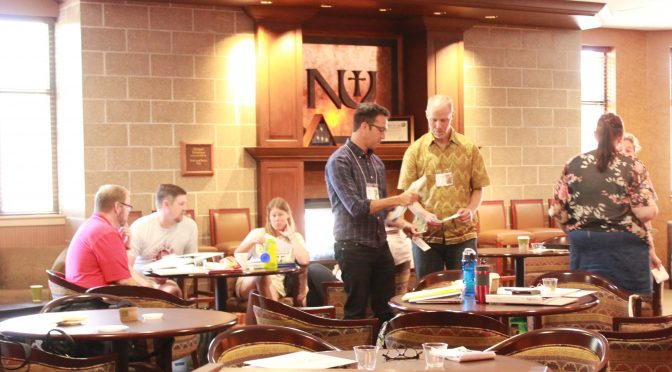For some, learning is easier when the subject is brought to life — and Reacting to the Past does just that, taking learning to a highly interactive level.
Beginning in the late 1990s, Mark C. Carnes, a history professor at Barnard College in New York, started a method of teaching that has become more readily used in university classrooms. The concept of Reacting to the Past is to take a moment in history and turn it into an interactive learning experience that teaches more than just historical facts.
Newman University recently hosted the 2017 Reacting to the Past game development conference, the sixth of its kind, It took place July 12-15 and brought 52 attendees from around the world. The objective of the conference is to allow game authors to play test the games and receive feedback from peers. The conference also allows attendees to pitch new ideas they might have for a game.

Newman University Professor of History and Chair of the Division of Humanities Kelly McFall is a member of the Reacting to the Past Consortium Board. He said the games provide essential skills that the students will take with them throughout life.
McFall said when the students are engaging in the games, “they’re also, at the same time, practicing their debating skills and practicing persuasive speaking, both impromptu and formal. They are practicing persuasive writing, and they’re doing research. They’re learning how to be flexible because they’re learning how to persuade somebody. You have to understand the person’s position and understand how you can change that position.”
Bella Pori, a legislative assistant in New York, attended Barnard College and has been involved in Reacting to the Past since then.
“I started reacting when I was in college at Barnard and I came to the GDC (Game Development Conference) last year because I was working on my own game. When you want to shop your game, the GDC is the best place to be. I’m here because I really love reacting and it’s the only place I can get feedback on my game.”
McFall co-authored a game with Rebecca Livingstone of Indianola, Iowa. Livingstone attended the conference to play-test her current game based on the Paris Peace Conference that ended World War I.
Livingstone said she was introduced to teaching with educational games by a colleague and became interested right away. “I was hooked and started doing it in my class. I’ve gotten students who would otherwise just sit there to really start to pipe up and talk about complex philosophical ideas or themes that I don’t think I would have been able to do otherwise.” She said she’s been using reacting for nine years.
“You’re putting yourself into somebody else’s shoes when you’re playing your own role,” said McFall. “And you’re putting yourself into a variety of other shoes when you’re trying to persuade other people. That’s what we want our students to do, to be able to understand what it’s like to be somebody else.”


